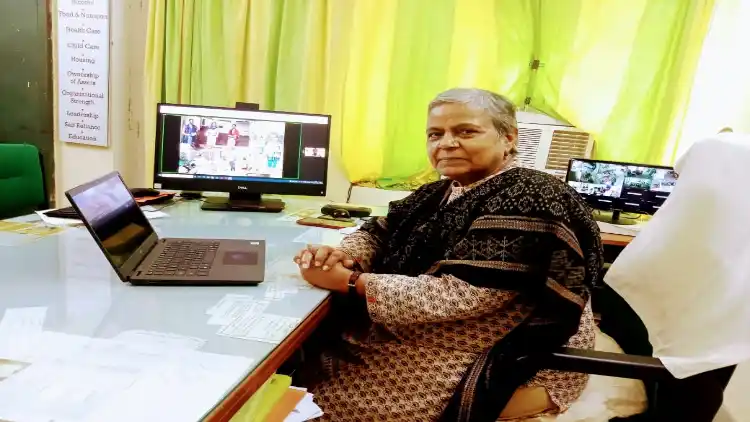
Neelam Gupta/New Delhi
Santoshi, Laxmi, and Rakhi are now ready to don an apron and a cap to start their bakery units and make a living out of it. For many years, they only knew how to create intricate designs of Chikankari, Zardozi, and other traditional embroideries with needles and thread on clothes. They learned the art of baking food during the second wave of Corona when people all around were running to hospitals spending money on expensive treatment and those who escaped the virus living in poverty due to loss of jobs and livelihoods.
In that situation, Lucknow Mahila Sewa Trust, an affiliate of the Ahmedabad-based NGO Self Employed Women’s Association (SEWA), trained its members in baking. The three women were fortunate to be selected for the first batch.
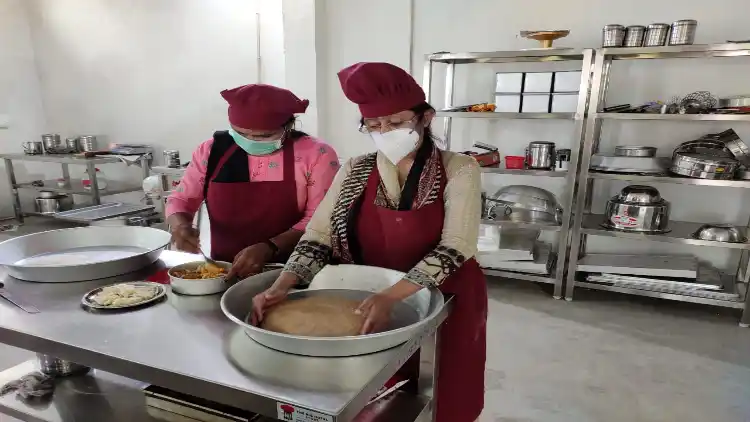
Women in Jeevika Bakers
While the lockdown continued, they would make buns and supply these to the government hospitals at lower rates than branded buns. It helped the poor and the needy in hospitals get affordable food and for them to make a living and provide for their families in a difficult time.
All credit for not letting the crisis go unchallenged goes to Farida Jalees, founder and director, LMST.
She inducted the three and many others to learn the art of baking. This has since become a start-up of her Trust and she has named it Jeevika Bakers. The hands that would do embroidery and stitching are now making baked goods for the market.
Most members of her Trust had stopped receiving orders from traders and designers for embroideries in the second wave of Corona. Most of them are poor and some sole bread earners of their families.
Farida Jalees set up Mahila Sewa Trust in 1988. At present, she works with 1.5 lakh self-employed women across 14 districts of Uttar Pradesh.
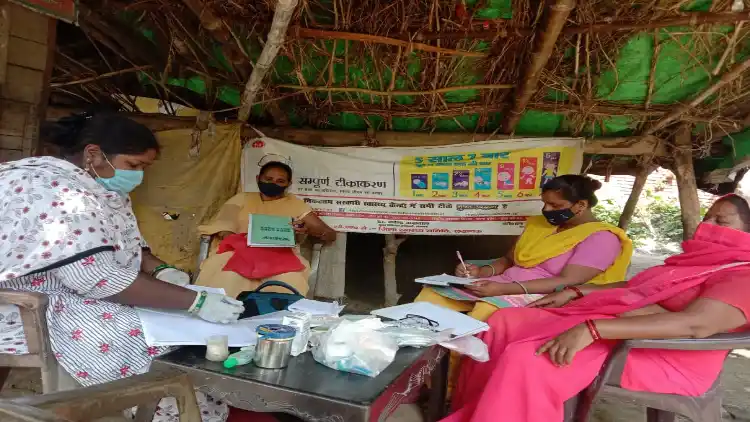
Sehat Salamati counter of Farida Jalees's Trust
Farida is no ordinary woman; she has survived cancer and Covid-19 to stay in touch with her members round the clock.
No wonder this gutsy woman turned the crisis into an opportunity and her Trust started five new startups to generate alternative ways of employment and also skills for the women of her organization.
Farida says, “When the second wave of Corona started in March, suddenly life came to a standstill; I lost touch with my sisters (members). After some time when I started communication with members living in villagers, I realised many were dealing with Covid-19. They lacked awareness about the disease; its prevention and cure.”
Farida felt it was her responsibility to help them deal with this crisis “They should know about the disease, its management and also the fact that its impact will stay for a longer period,” she told Awaz-the voice.
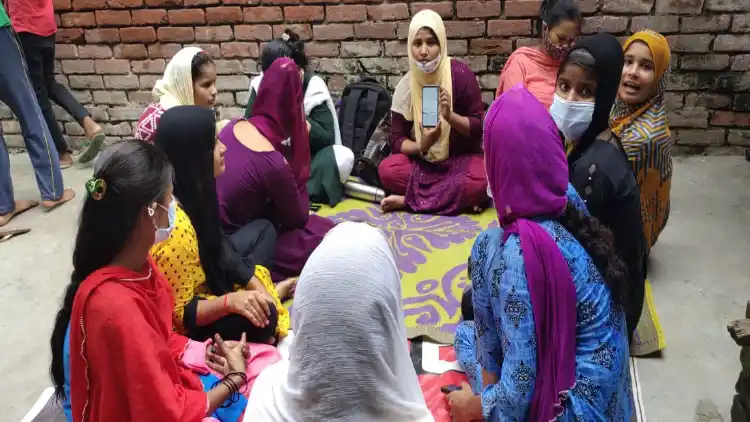
A meeting of Farida Jalees's trust members for digital literacy
With the support of the mother organization SEWA, Farida organized the services of a doctor to create basic awareness among her members about the pandemic. He explained to women about the diseases; their prevention; home remedies etc. The members were taught to operate the types of equipment like Oximeter, Glucometer, BP, and sugar measuring machines and use of basic medicines.
Farida started Sehat salamati services, an extended healthcare support center, for its members in its offices. The members could get online consultations on CIovid and also sent medicines, equipment, and oxygen cylinders and concentrartors. He trust procured 53 oxygen concentrators that are now lying at her office.
After Jeevika Bakers and Sehat salamati, another of Farida’s startups is Kitchen-garden. According to Farida, since joblessness was rampant and many members had no money for food, she taught them to raise vegetables in waste materials like empty boxes, polybags, etc.
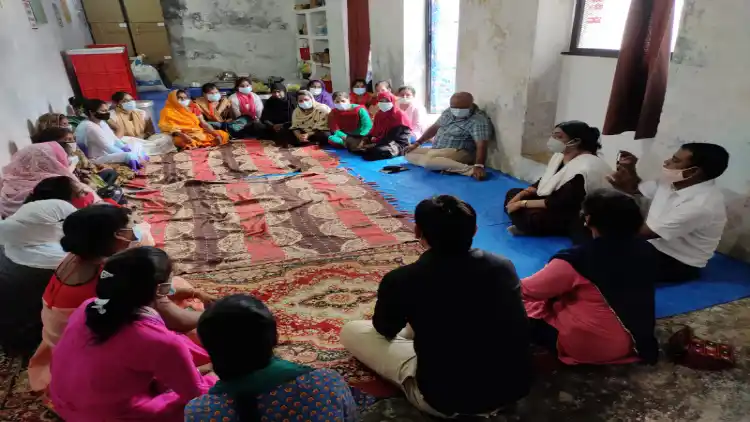
Women's session with a local doctor
Her SOS mantra is: “At least grow coriander and make a chutney of it and eat it with rice (provided free by the government).” Today most of her trust members have their big and small kitchen gardens -with coariander a must-have - and grow their vegetables to avoid buying from the market.
In the first wave of the pandemic, Farida says her trust had launched two startups – one was on digital literacy and the other on marketing.”
Farida created a WhatsApp group for members and encouraged them to start sharing their thoughts, difficulties, and question on it. For this, women, mostly illiterate and not much educated, were trained in digital communication. Gradually, the members started making the videos and sending them for being posted on YouTube.
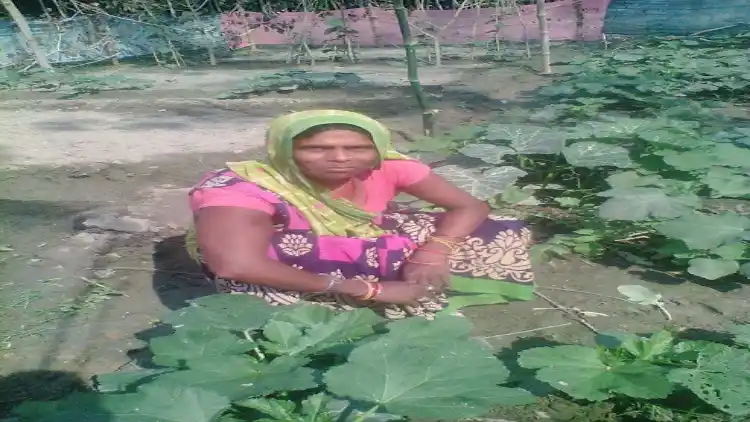
A SEWA members shows her vegetable garden
Farida says, “My concern was that in the changed circumstances what should be done for our members so that they have cash in their hands. The government was providing them grains but a family also needs milk, vegetables, oil, etc to make basic food.”
Ramazan had started and Farida appealed to people to donate Zakat for feeding the needy. She thus collected Rs 40,000 and invested it into her next startup.
She gave Rs 2,000 each to women in Rae Bareli, Barabanki, Firozabad, and Lucknow and asked them to invest it in business. The business was about selling small quantities of tea, lentils, sugar, and salt, etc. in paper bags made from the old notebooks and books at home and selling these to the people around them.
The business mantra was: each packet should be priced not more than Rs 10-15. Farida says the logic behind this was that those days with less money in hand people could only afford to buy smaller quantities. It worked well for many members. The women learned a lesson in marketing as they started door-to-door sales in their neighborhoods.
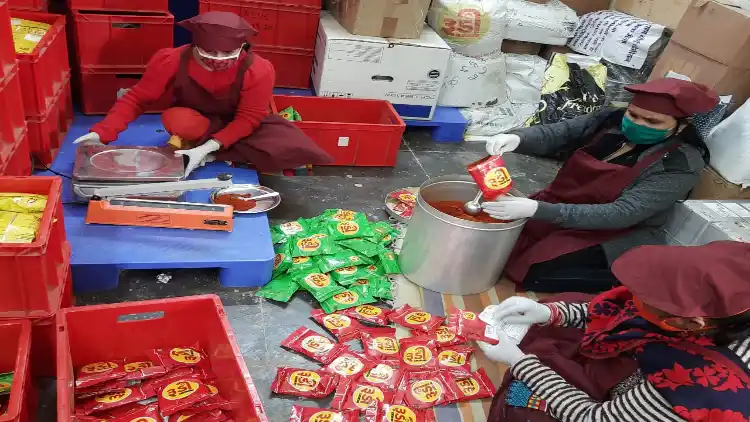
Packaging the kitchen essentials at SEWA center
The masks became ubiquitous those days. Making masks was easier for women who were good seamstresses, but the problem was where to get the cloth, thread, etc for stitching these in the lockdown.
Farida hit upon a plan; she contacted known tailors and asked for shredded pieces of clothes that go to waste. With a Curfew pass, she and other leaders collected kilos and kilos of shredders free of cost and sent them to women. The model was replicated in other cities. This led to the members making masks and selling these online through WhatsApp groups and social media.
Initially, they sold in retail, and later some institutions started giving the Trust big orders. The National Rural Livelihood Mission, Ferozabad, gave them the first big order. Farida’s idea had succeeded.
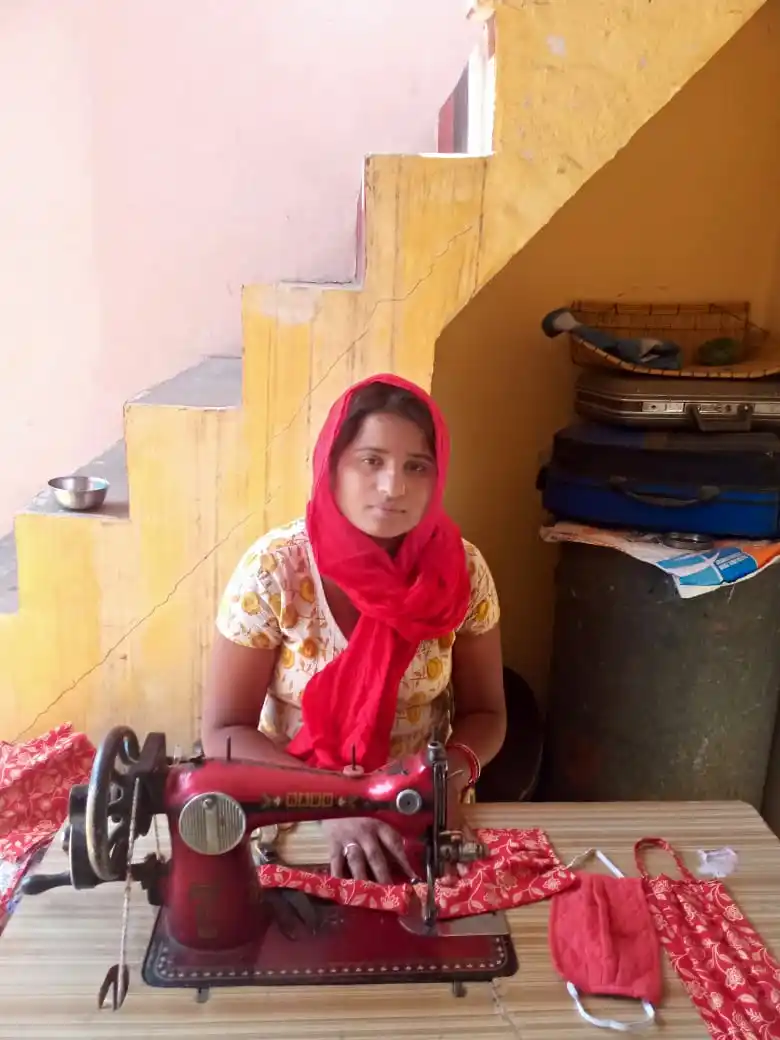
A Trust member sewing facial masks
Farida is proud that her members, who were good only good at making zardozi and zari, and chicken work embroidery, have learned the sale and marketing. Women of her trust today understand the market and many have turned entrepreneurs.
Farida not only gave livelihood and hope to 1.5 lakh women in the crisis, but she also made many of them entrepreneurs as they started their bakery units. Many team leaders have since become trainers.
In the second wave, Farida was afflicted with Covid-19. She quickly shifted to her brother’s vacant house as it was close to her office and kept giving instructions to her members with the help of her husband Jalees Ahmed.
For about a month and a half, Jalees answered all her calls and passed on instructions to the members during her illness.
Farida’s innovations, dedication, and leadership is the reason for Rising Beyond Ceiling Publication including her name in hundred top Muslim women who are working on out of the box ideas.
